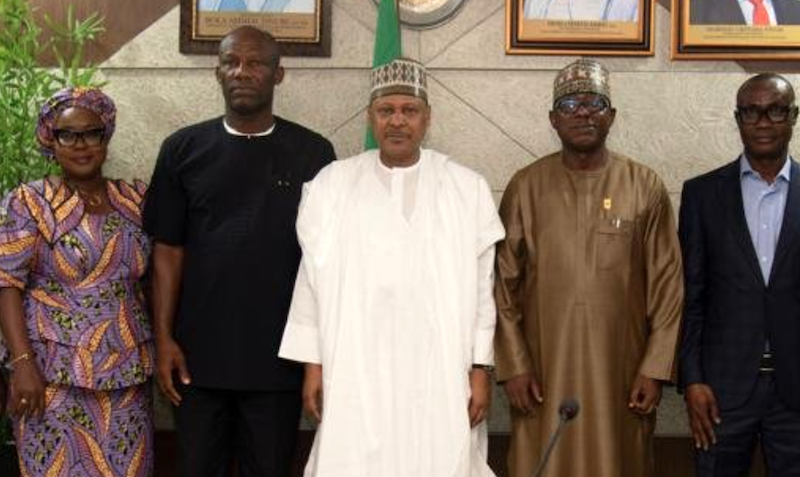The Minister of Information and National Orientation, Alhaji Mohammed Idris, has assured the Nigerian Guild of Editors (NGE) of cooperation in their quest to seek for harmonisation of conflicting and overlapping media laws.
Idris gave the assurance on Wednesday in Abuja when a delegation of NGE led by its General Secretary, Mr Onuoha Ukeh, paid him a courtesy visit.
During the visit, NGE presented a compilation of laws in the Criminal and Penal Code as well as Cybercrime Act that contradicts other laws in the 1999 Constitution as amended.
The report recommends the harmonisation of conflicting and overlapping laws that relate to media practice in the country.
According to the Minister, both the government and media are for the good and benefit of the people.
“I don’t think one should negate the other. What you are doing today is encouraging; instead of putting these on the pages of newspapers, you are here and bringing your inputs.
“I will engage with the Attorney General of the Federation and other stakeholders. Also, you could engage the National Assembly too.
“I will work with the report, set up a committee and other stakeholders to work on this, so that we can do a good job.”
He encouraged the Guild to always stand on the part of truth and condemn any wrong doings by any of its members.
The Minister explained that the National Assembly is currently working on the National Broadcasting Commission Act and the Cybercrime Act, adding that a call for submissions had been made.
“We are all in this together. We should also understand that we must have a country before having the Nigerian media, meaning, it is the country first.
Speaking earlier, Ukeh said the Guild was at the Ministry to present its media law reports to the Minister.
He said he did that because of the concern about some laws regarding media practice and press freedom in Nigeria.
Ukeh stressed the need to review some of the laws, particularly the ones made during colonial and military era that are now outdated and contrary to the constitution.
Meanwhile, the Chairman of the NGE’s Media Law Committee, Mr Richard Akinnola said that a number of countries have gone beyond what Nigeria has today as media laws.
“Take for example the issue of sedition law of Section 50 (1) and Section 51 (1 and 2) of the Criminal Code, they have been nullified by the Court of Appeal in 1982. We believe that the sections should be formally repeal from our books.
“We have the Criminal Defamation Law which has been abused severally. It is contained in Section 373 of the Criminal Code.
“We recommend that the criminal defamation law should be expunged from our law just like Ghana, Liberia and Sierra Leone did.
“We also have some laws that are overlapping in our Penal and Criminal Code which should be harmonised. We believe that freedom of expression comes with responsibility. Every freedom has it own limitations, ” Akinnola said.
He noted that section 24 of the Cybercrime law has been abused over time, adding that the Cybercrime law is a good one, but that section ‘b’ of the law which talks about Cyber bullying is vague.
“All these arrests of cyber bullying are illegal. Any person that feel aggrieved by a malicious publication should take recourse to section 59 of the Criminal Code.
“We made a lot of recommendations in the reports which we believe will enhance media practice in the country.
“We also have a plan to engage the Attorney General of the Federation and the National Assembly, ” Akinnola said.
Tinubu never asked me to lie, arrest or harass journalists – Information Minister
Meanwhile, the Minister of Information and National Orientation, Alhaji Mohammed Idris, has said President Bola Tinubu never asked him to lie, arrest or harass any journalist because of unconstructive criticism and reportage.
Idris stated this while receiving a delegation from the Nigerian Guild of Editors (NGE) led by its General Secretary, Mr Onuoha Ukeh, and Deputy President, Mr Sebastian Abu, in Abuja on Wednesday.
According to him, in spite of negative criticism and alleged defamation of character by some journalists and members of the public, the President had never given him a marching order to arrest or harass anyone.
“There are times when the media instigate tension, but Tinubu never urged me to alter the narrative, lie, arrest or harass the perpetrators.
“This is because the President is a true democrat who respects the rule of law. Also, the Federal Government believes that it cannot operate without the media, which is the fourth estate of the realm.
“We used to have some individuals who would want to go overboard, but I have always engaged the Nigeria Union of Journalists, NGE, Newspapers Proprietors Association of Nigeria and others on issues that are brought to my attention.
“I have always said that when we do good praise us, and when we are not doing well or going overboard, tell us constructively so that we can improve.”
He said that the Tinubu administration is media friendly and will continue to be, and therefore the media should not use isolated incidents to conclude that the government wants to gag the press.
The Minister noted that Tinubu’s commitment to press freedom led to the establishment of the Media Literacy Centre (MIL) at the National Open Unity in Abuja by UNESCO.
According to Idris, the country has passed the hurdles and is now at the final ratification stage of Nigeria getting the host.
“This is a great achievement, because when established, the MIL Centre will bring stakeholders from across the globe to Nigeria.
“This will enhance media literacy in our country and checkmate the spread of fake new and issues of misinformation and disinformation in the country and the world at large,” Idris said.


